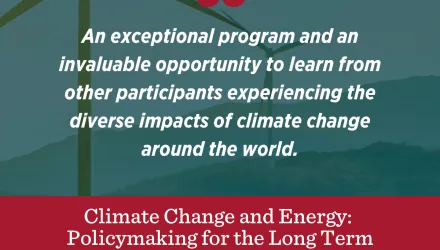Harvard Project Releases a Collection of Expert Briefs on the Elaboration of the Paris Agreement
Overview
The Paris Agreement is a breakthrough in multilateral efforts to address the threat of global climate change. For the first time, an international agreement to reduce greenhouse-gas emissions includes contributions from all of the major-emitting countries—and, indeed, a large majority of the countries of the world. In addition, the Agreement includes a dynamic feature through which mitigation commitments can be strengthened over time.
While the Agreement sets forth an innovative and potentially effective policy architecture, a great deal remains to be done to elaborate the accord—to formulate the many rules and guidelines required and to specify more precise means of implementation. Governments, other stakeholders, and researchers also need to think about constraints on the effectiveness of the Paris Agreement—and identify organizations and processes that could complement the Agreement and the UNFCCC process more broadly.
The Harvard Project on Climate Agreements hosted a research workshop at the Harvard Kennedy School on July 14–15, 2016, the purpose of which was to identify options for elaborating and implementing the Paris Agreement—and to identify policies and institutions that might complement or supplement the Paris-Agreement regime. Participants included twenty-three of the world's leading researchers focusing on climate-change policy, representing the disciplines of economics, political science, international relations, and legal scholarship. They are based in Argentina, Belgium, China, Germany, India, Italy, Norway, the United Kingdom, and the United States. (An agenda and list of participants is included near the end of this volume.)
Participants subsequently prepared the briefs that are included in this volume, based largely on their presentations at the workshop, addressing opportunities for—and challenges to—elaborating, implementing, and complementing the Paris Agreement. These briefs are organized in five sections: enhancing mitigation ambition, elaborating the Agreement's transparency mechanism, advancing market mechanisms (in and out of the Agreement), exploring complementary processes and institutions, and financing mitigation and adaptation. Each brief provides a summary in the form of several key points, and a compilation of the key points is provided after this preface. The briefs are designed to be readily accessible—and, it is hoped, useful—to negotiators and policy makers, as they consider how to elaborate the Paris Agreement in order to realize its potential to effectively address global climate change.
Stavins, Robert N and Robert C. Stowe. “The Paris Agreement and Beyond: International Climate Change Policy Post-2020.” Harvard Project on Climate Agreements, Belfer Center, October 2016







